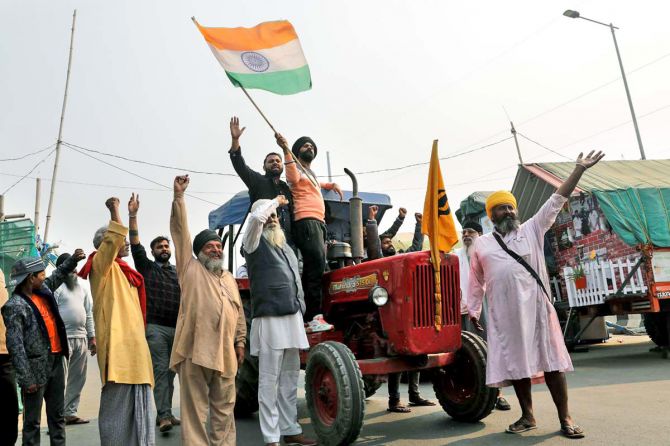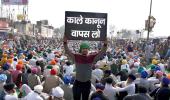Critics who cannot stop gloating, pronouncing Modi to be a lame-duck prime minister, may be making a huge mistake, predicts Virendra Kapoor.

Did he bow to the inevitable?
Or, like a good general, decided to retreat, to conserve his energies to fight another day?
Whatever the answer, there is no denying that Modi withdrawing outright the three farm laws represents a setback, giving opponents the bragging right to gloat over his seeming come-uppance.
Not for long, though.
That he had valiantly held steadfast to the well-meaning and long-overdue reforms, which had the approval of top domain experts, refusing to budge for over a year even as the noisy and often violent protests simmered on the borders of the national capital, and on a occasion spilled into the heart of the Lutyens' Delhi, the repeal of the reforms would appear all the more surprising.
At one level, the decision militates against the strong-leader image the prime minister had carefully cultivated.
But critics who cannot stop gloating ever since Modi announced the decision in an extraordinary national broadcasting timed with the Gurupurab on Friday, November 19, pronouncing him to be a lame-duck prime minister more than two years before the scheduled end of his second five-year term, might again be making a huge mistake.
A consummate politician, Modi can be relied upon to turn this seeming adversity into advantage, particularly if his party were to do well in the ensuing assembly poll in Uttar Pradesh.
Indeed, the felt need to retain UP at all costs, and thus put paid to the ambitions of a fragmented but baying Opposition to lay him low, may well have been the actual spur behind the repeal of the controversial reforms.
After Friday, the sting from the Opposition charge that Modi was anti-farmer was well and truly taken out.
Aside from well-to-do Punjab farmers, the anti-reform protest was largely confined to the Jat-dominated Haryana and parts of western UP.
The repeal allows the Bharatiya Janata Party to again win over the Jats and try and repeat the stupendous success in the region both in the 2017 assembly poll and the 2019 Lok Sabha poll.
It is significant that the UP government had requisitioned farmers' leader Rakesh Tikait's services to hurriedly contain the fallout arising from the violent incidents in Lakhimpur Kheri in early October when four protesting Sikh farmers were allegedly mowed down under the vehicle of a SUV driven by a local BJP activist.
Tikait had helped calm things in the Sikh farmers-dominated Terai region.
After Modi's peace offering on the holy Gurupurab, even they may not feel strongly to take up cudgels against the BJP and thus alienate the non-Punjabis who outnumber them in the region.
But back to the withdrawal of the farm laws.
Of course, it is a huge setback for the reforms process.
Quite clearly, divisive politics is the enemy of reforms.
The only time actual reform was possible through the front door was when the country was in the throes of a crisis -- such as the balance of payments crisis in 1991 which forced economic liberalisation.
Otherwise, reform incremental reform by stealth stands a chance of passing muster in a noisy and highly fractious democracy.
Modi erred in trying to force the reforms down the gullet of the vested interests who had come to have a stranglehold over the agricultural markets, particularly in Punjab and Haryana.
But the intent behind the reforms could not be questioned.
Freeing growers, especially numerically large holders of small and marginal farmers, was a major objective.
The vice-like grip of arthiyas and the APMC mandis they controlled had always shortchanged small and marginal farmers, obliging them to sell at the place and price of their choosing.
The new law allowed farmers to consolidate their holdings in partnership with other small farmers and sell the produce at an equitable price at the farm gate itself to corporates or other aggregators in the field.
The infusion of fresh capital, creation of cold storage chains to conserve and process farm produce, and to ensure that actual producers received a fair and equitable price were worthy objectives.
Unfortunately, the relatively well-off Punjab farmers with the active support of the Congress-led Punjab government succeeded in thwarting the agri reforms.
Ironically, it was Captain Amarinder Singh as Punjab chief minister who supported the farmers protest to the hilt.
Since his recent eviction from the chief minister's post, followed by his decision to float his own party, most ironically he offered his services to act as a bridge between the protesting farmers and the central government.
Without doubt, the decks were cleared on Friday for a BJP-Amarinder alliance in Punjab after the repeal of the controversial laws.
As someone who had actively worked with the protest leaders, Amarinder would hope to reap goodwill now that the demand for the repeal was fulfilled.
As for the BJP, following the repeal, it would cease to be an untouchable in Punjab, though it had failed to strike deep roots in the Sikh-dominated border state all along.
The Amarinder-BJP alliance in the state is assured of the urban BJP voter aside from floating voters who hold him in high esteem.
Meanwhile, those in a hurry to write off Modi need only recall how he had felt obliged to beat a retreat on the amendment to the land acquisition law.
The law enacted by the UPA under siege from the anti-corruption protests was so one-sided that it made future acquisition for public and private infrastructure prohibitively expensive and cumbersome.
In his reformist zeal, Modi amended it through an ordinance before opposition forced him to abandon it.
Since then, only Nitin Gadkari's ministry has taken the lead in acquiring private land for roads and highways while private sector has flinched from paying four times the market rate as compensation.
Yet, Modi not only survived that early climb-down, but has since gone on to trounce the Opposition in several state elections and in the parliamentary poll.
In short, don't rush to write his political obituary, at least not as yet.
Do note that the repeal of the farm laws is actually meant to further boost the prospects of the ruling party in UP, crucially the only state among the five going to polls next year which matters politically.
Besides, it is not in Modi's mental make-up to lie low and yield the upper hand to opponents.
And one more thing: Has the repeal of the farm reforms persuaded the fragmented Opposition to coalesce under the leadership of Rahul Gandhi?
Feature Presentation: Aslam Hunani/Rediff.com











 © 2025
© 2025